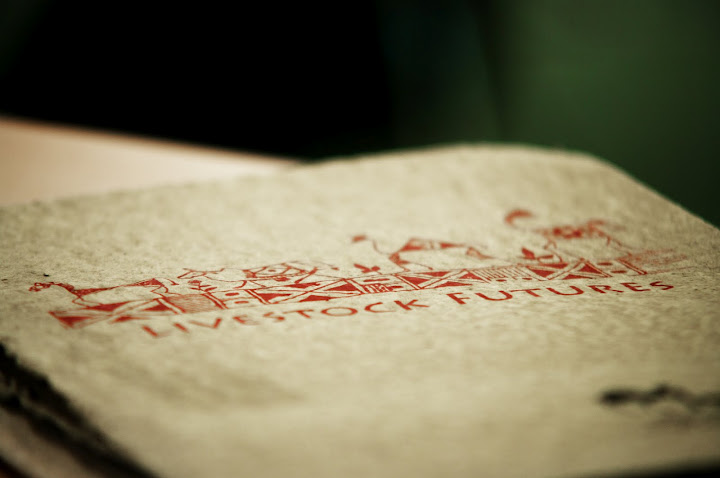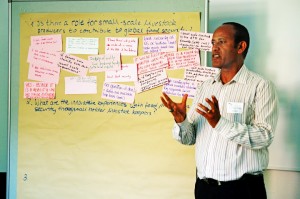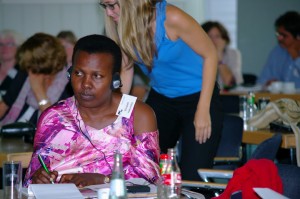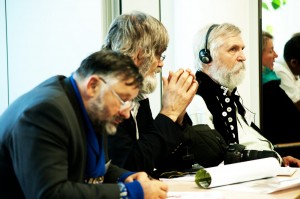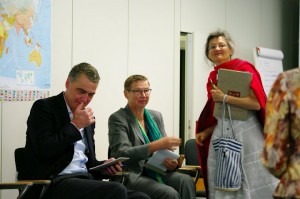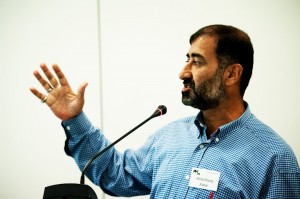Introductory Presentation The Future of Livestock Keeping: What’s at stake? Ilse Köhler-Rollefson, LPP
Presentation by Katrien van’t Hooft, TradiNova: Lessons learnt from (dairy) farming in the Netherlands.
Input paper Part I and Part II (PDF)
WG 1: Are there feasible alternatives to industrial livestock production? What is the scope and potential of small-scale livestock keeping, incl. pastoralism, to contribute to global food security?
Facilitator: Getachew Gebru, MARIL
Input papers:
- Developing small-scale livestock breeding: some practical considerations by Nancy Abeiderrahmane, Tiviski
- Feasible alternatives to industrial liovestock production. Markus Arbenz, IFOAM
- Livestock Futures – the need to look for alternatives. Kamal Kishore, Rainfed Livestock Network
Recommendations WG 1
WG 2: The pro-poor angle of livestock development: Do current policies really help the poor? How could their poverty alleviating impact be improved?
Facilitator: Inge Barmentlo, Cordaid and CELEP focal point
Input papers:
- Debt for progress: Does it pay off for poor livestock keepers? Evelyn Mathias, LPP
- Livestock policies and the position of Bahima women in Uganda. Elizabeth Katushabe, PENHA Uganda
- Are current livestock policies poor-poor? Impressions from India. Nitya Ghotge, ANTHRA, India
Recommendations WG 2
WG 3: (in German) Wie müssen die politischen Rahmenbedingungen gestaltet werden, um Familienbetrieben das Überleben zu ermöglichen?
Facilitator: Andreas Bergmann, Die Linke
Input papers:
- Traditionelle Tierhaltung in Patagonien, Argentinien. Bedrohungen und Herausforderungen. Maria Rosa Lanari, INTA, Argentina
Recommendations WG 3
WG 4: International trade, livestock systems sustainability, public health and animal welfare – are they compatible and how can these goals be better aligned?
Facilitator: Bernhard Walter, Bread for the World
Input papers:
- Cows are not climate killers. Anita Idel
- WSPA’s humane sustainable agriculture programme. Lesley Lambert, World Society for the Protection of Animals
- The usefulness of agri benchmark for developing and emerging countries. Ernesto Reyes, agri-benchmarking project
Recommendations WG 4
WG 5: Biocultural Protocols and Approaches to Access and Benefit-Sharing for Animal Genetic Resources
Facilitator: Irene Hoffmann, FAO
Input Papers:
- Biocultural Protocols: maing native livestock systems visible. Abdul Raziq Kakar, SAVES
- The Samburu Biocultural Protocol. Cleopas Okore, Kenya
- The Raika Biocultural protocol: Securing resources for future livelihoods. Hanwant Singh Rathore, LPPS
Recommendations WG 5
Livestock Futures Conference press release (english)
Livestock Futures Conference Pressemeldung (deutsch)
Conference video (in German)
Kurzdokumentation der Livestock Futures Konferenz über die Zukunft der Nutztierhaltung
von Anne Welsing
Photo story: Livestock Keeping: Building a future by Susie Emmett, Green Shoots Productions
Much of the meat, milk and other products we enjoy from animals are produced by small scale livestock keepers and pastoralists. But their livelihoods are under threat. How to help?
The League for Pastoral Peoples and Endogenous Livestock Development (LPP) brought together livestock keepers and international experts in Bonn, Germany for ‘Livestock Futures’. In this photo story they share their visions for the future and how to help small scale livestock keepers and pastoralists to thrive.
Conference Documentation
The Conference „Livestock Futures“ has highlighted the importance of integrating small scale livestock keepers in the dialogue about food security, biodiversity and environment conservation. Their contribution to these topics is invaluable and must be recognized.
Download Documentation

